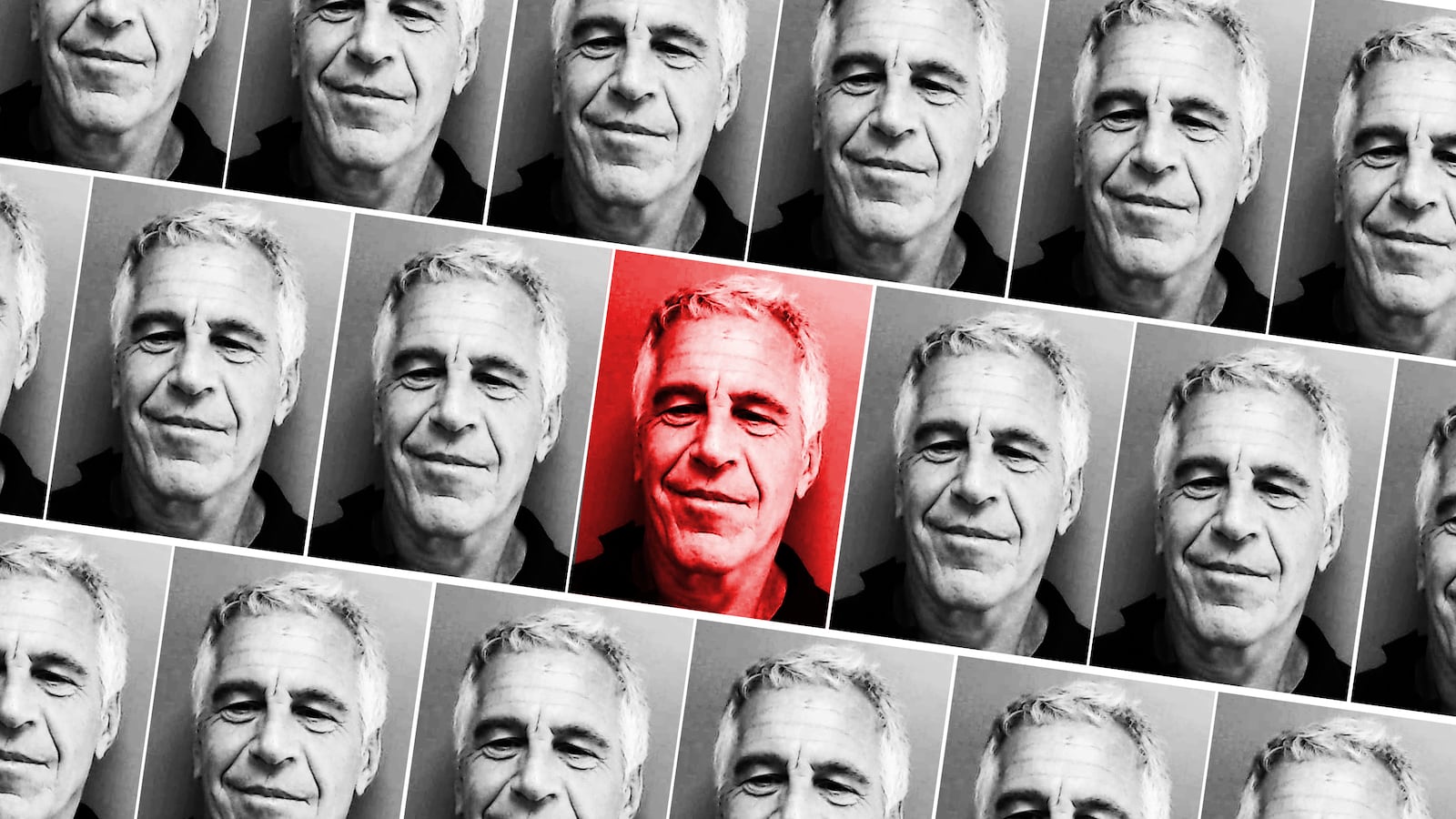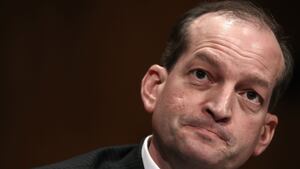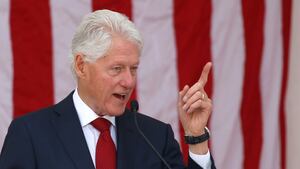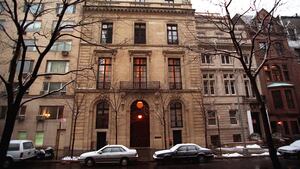Editor's note: On August 10, 2019, Jeffrey Epstein died in an apparent jailhouse suicide. For more information, see The Daily Beast's reporting here.
If you didn’t know who Jeffrey Epstein was last week, you do now. The Daily Beast has been covering the financier for years, so we put together a primer on the tangled history of the allegations against him and what’s happening now.
Why was Jeffrey Epstein in court MONDAY?
Epstein, who was arrested over the weekend, was being arraigned on a new indictment obtained by federal prosecutors in Manhattan that charges him with sex trafficking and conspiracy. It accuses him of paying underage girls for massages that became sex acts and of paying some of those same girls to recruit new victims. Epstein pleaded not guilty and was ordered held until his next court appearance on Monday.
Wait, wasn’t Epstein charged with those things before?
Not exactly. In the mid-2000s, after a complaint from the parents of an underage girl, Florida police began investigating Epstein and uncovered accusations that are nearly identical to those in the new case. The feds were brought in, and a 53-count indictment was drafted but never filed and Epstein never faced federal charges. Instead, the U.S. attorney in the Southern District of Florida at the time, Alex Acosta, signed off on a sweetheart plea deal, agreeing not to prosecute Epstein and any accomplices if he pleaded guilty to two state prostitution charges. The financier served 13 months (though he was allowed to leave for work every day), and he had to register as a sex offender.
Acosta? That name sounds familiar.
It should. Alex Acosta is now President Trump’s labor secretary. He has come under blistering criticism for OKing a non-prosecution agreement without notifying Epstein’s accusers. In February, the Justice Department’s Office of Professional Responsibility launched an investigation into whether there was anything improper about the deal. A federal judge has already ruled that it violated the law because the victims were kept out of the loop. Some Democrats in Washington have called for Acosta to resign his Cabinet position because of his handling of the case. But Acosta told a congressional hearing that his office was actually “too aggressive.”
If the feds agreed not to prosecute him, why is he back in court?
The U.S. Attorney’s Office in Manhattan contends that the deal Acosta made with Epstein does not preclude it from bringing new charges. The indictment they obtained accuses Epstein of a multi-state conspiracy in which girls were sexually exploited both at his Manhattan mansion and his Palm Beach estate. It covers three girls, one from New York and two from Florida, who were allegedly abused between 2002 and 2005. You can bet Epstein’s legal team will try to get the indictment tossed by arguing it violated the 2007 non-prosecution agreement. In court on Monday, they called it a “do-over.”
What does Epstein say about the trafficking charges?
Epstein has long maintained that any sexual contact was consensual and that he thought all the girls were 18 or older. However, the Manhattan indictment says he asked the girls their ages and they told him they were minors. In addition, prosecutors say when they raided his seven-story Upper East Side mansion, they found hundreds, if not thousands, of photos, some of which appear to be of underage girls and had labels like “girl pics” and “young.” In court on Monday, Epstein’s lawyer got into a bit of rhetorical trouble when he tried to shrug off the allegations as “statutory rape”—then backtracked to say it couldn’t be rape because there was no penetration.
Is anyone else in trouble?
Unclear. When a judge asked if anyone else would be charged, prosecutors said there was no immediate plan to file a superseding indictment but left the door wide open for one in the future. That would allow them to add new charges against Epstein, as well as new defendants. The indictment refers to three unnamed employees who allegedly helped Epstein arrange the sexual encounters, but their legal status is unknown. Prosecutors could also expand the case to include anyone else who had sexual contact with the alleged underage victims on Epstein’s property.
Well, were other men involved?
That’s the billion-dollar question. A number of women who have publicly accused Epstein in the past say they were essentially shared with the money manager’s rich and powerful friends. A woman named Virginia Roberts Giuffre alleges that Epstein kept her as a sex slave and loaned her out to pals, including Prince Andrew and Harvard Law Professor Alan Dershowitz. Both men have vigorously denied the accusation. On Monday night, former President Bill Clinton issued a statement saying that while he had taken four long trips on Epstein’s plane he knew nothing about what Clinton called his “terrible crimes.”
What evidence of ‘terrible crimes’ do prosecutors have?
In various documents and statements in court, Manhattan prosecutors indicated that three victims can testify that they were among dozens of young girls trafficked by Epstein. In addition, authorities have secured call records and seized notes and messages from Epstein’s house that they say corroborates the victims’ stories. They are still going through the nude photos to determine how many of the subjects were underage when they were taken; they said they have determined at least one was. Prosecutors also noted that in one room of the mansion, they found a massage table, sex toys, lubricants, and photos—a setup matching the description of the room where accusers say the abuse took place.
Why are there only three victims?
It’s not clear how many girls or women Manhattan prosecutors spoke to and vetted before they obtained the indictment, but the current charges relate only to three. More charges and victims could be added at a future date. Prosecutors say that after Epstein was collared at a New Jersey airport on Saturday night, they received calls from other women, and they encouraged anyone with a story to tell to contact the FBI.
What’s next?
Epstein’s lawyers are trying to get him out of jail. Prosecutors argued that his wealth, his globe-trotting lifestyle, and the seriousness of the charges mean that he’s a huge flight risk who should stay locked up at the Metropolitan Correctional Center (home to drug lord El Chapo). Defense attorneys have to file their request for bail this week and then a judge will decide where he stays until trial when he’s back in court on Monday.
That’s what’s happening in the criminal case. On the civil front, there are a number of lawsuits pending. Last week, an appeals court ordered the release of sealed records in a defamation suit that Giuffre had filed against Epstein’s alleged madam, British socialite Ghislaine Maxwell. The suit was settled in 2017 and the court sealed 167 documents, but the Miami Herald—which published a major investigation of Epstein and his plea deal—sued to make them public.
How did Epstein get so rich?
Although his exact worth is a mystery, there is no question that Epstein is immensely wealthy. In addition to the seven-story manse on the Upper East Side and the palatial estate in Palm Beach, he owns a spread in New Mexico, a home in Paris, and a private island—yes, the whole thing—in the U.S. Virgin Islands, two planes, and a fleet of fancy cars. How he amassed such a fortune has been a closely guarded secret. We know that after a teaching job he began his career in finance at Bear Stearns, rose up through the ranks, and then left, as Vicky Ward reported in The Daily Beast, under a cloud.
He started his own firm, reportedly managing the money of billionaires for a cut, but to this day, his clientele is largely a question mark. One exception is Victoria’s Secret mogul Les Wexner, his only confirmed client. Wexner previously owned Epstein’s Manhattan home, though The New York Times reports that city records don’t list details of the sale. Prosecutors say the building is worth $77 million—and they are seeking forfeiture of it.









